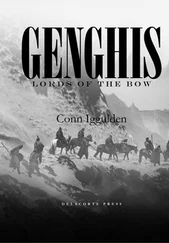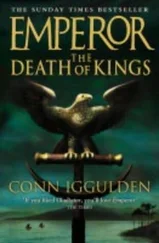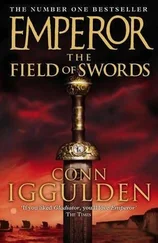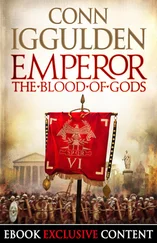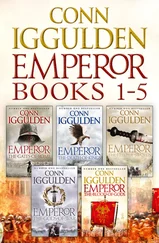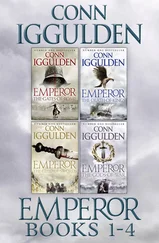Conn Iggulden - The Gods of war
Здесь есть возможность читать онлайн «Conn Iggulden - The Gods of war» — ознакомительный отрывок электронной книги совершенно бесплатно, а после прочтения отрывка купить полную версию. В некоторых случаях можно слушать аудио, скачать через торрент в формате fb2 и присутствует краткое содержание. Жанр: Исторические приключения, на английском языке. Описание произведения, (предисловие) а так же отзывы посетителей доступны на портале библиотеки ЛибКат.
- Название:The Gods of war
- Автор:
- Жанр:
- Год:неизвестен
- ISBN:нет данных
- Рейтинг книги:5 / 5. Голосов: 1
-
Избранное:Добавить в избранное
- Отзывы:
-
Ваша оценка:
- 100
- 1
- 2
- 3
- 4
- 5
The Gods of war: краткое содержание, описание и аннотация
Предлагаем к чтению аннотацию, описание, краткое содержание или предисловие (зависит от того, что написал сам автор книги «The Gods of war»). Если вы не нашли необходимую информацию о книге — напишите в комментариях, мы постараемся отыскать её.
The Gods of war — читать онлайн ознакомительный отрывок
Ниже представлен текст книги, разбитый по страницам. Система сохранения места последней прочитанной страницы, позволяет с удобством читать онлайн бесплатно книгу «The Gods of war», без необходимости каждый раз заново искать на чём Вы остановились. Поставьте закладку, и сможете в любой момент перейти на страницу, на которой закончили чтение.
Интервал:
Закладка:
The rain increased in power as it swept across the city, and Servilia wept again. Rome would be clean by the dawn of the ides of March. The past would no longer trouble her sleep.
CHAPTER 35
Julius walked alone through a waking city to the Senate house. His son had disturbed his sleep with crying and he was red-eyed, rising as the market stalls and traders were still setting up for the business of the day.
He preferred Rome at these moments after rain, when the air smelled fresh and clean and the day stretched far ahead with promise. It was true that the wind was cold, but he wore a heavy tunic under his toga and the touch of frozen air was pleasant as he breathed deeply.
No guards were there to disturb the peace of the morning. He needed no lictors to frown at his people as they passed with their eyes downcast. They may not have accepted the crown Mark Antony had offered, but the man himself was untouchable. He did not fear them as men like Sulla and Pompey had feared. They had treated the citizens as violent children, terrified of the same force that had brought them to power. He needed no such protection. Julius sighed to himself as he strolled along the stone walkway, lost in thought.
Without Cleopatra, he might well have left Rome months before. When he was far away, he could love his city as an abstract. He could talk of his home in the same breath as Alexandria, Carthage, and Athens, the centers of empires gone and still rising. The distance somehow lent a romance to the heaving ant-heap of reality. When Rome was thousands of miles to the west, he could see the glory of her scholarship, her inventions and trade. It was difficult to remember those things existed when he was suffocated amongst the petty rivalries and vanity of the Senate. There was such a chasm between the two. When he despaired, he saw only the worst face of the city of his birth. Life teemed there in filthy alleys and a few coins would have bought a woman, a man, or a child. When it was hot, the city stank like an open drain, and when there was frost, thousands starved and froze on a knife edge of survival. Those were the times when he could barely catch his breath. His inner vision crumbled against the hard truths and he ached to ride clear and leave it all behind.
To have the power to make changes had been intoxicating at first. Whatever he had the wit to imagine could be made, created new. It was a temporary joy, like so much else. He hungered for something he could never quite name, and when fresh-faced generals had come with news of unrest in Parthia, he had not sent them away. Mark Antony would rule Rome again, or Octavian perhaps. He had earned the right to leave his mark on the city, and until Julius's son became a man, the boy would need strong protectors. It would be Octavian, Julius decided, already imagining the expression on his face when he heard the news.
Outside the city, there were legions of young men gathering to march against the Parthians. His unease vanished in the presence of so much youthful hope. They had not been made cynical. They carried more than a sword and shield for Rome, he thought, groping for the idea. When they left, they carried a distilled form of the city with them, the purest part. It took them through pain and exhaustion. It kept their discipline when they saw death coming and suddenly knew it would not pass them by. By pledging their strength, each one of them gave a value to what they left behind. They were saying, "This is worth my life." And they made it so. There could be no value in a city without those young men to stand in the Campus.
Julius remembered what Brutus had said about the spring air raising his head, and he smiled as he walked. It was true that the thought of another campaign had stirred his blood. His time in Rome had been everything he had wanted it to be. His Triumphs would be remembered for generations and the Senate had honored him as no one else in history. Scipio would have given his right arm for the titles they had bestowed. Marius would have loved every moment.
Before Julius reached the bottom of the hill, he saw a lone figure in a toga so white it looked like winter frost. He frowned as the man began to walk in his direction. Could they do nothing until he had arrived? What new problem was so vexing and difficult that they must interrupt his thoughts before the day had even begun? He recognized Cassius as the man drew closer and bowed his head.
"Caesar, the Senate is meeting in Pompey's theater this morning. I have stayed to let you know."
"Why, what has happened?" Julius said, his calm evaporating.
"The ides of March fall on the anniversary of Pompey being made consul, sir," Cassius replied. "It was decided to honor his family in this way. The resolution was passed in your absence. I was worried it might not have reached you, and-"
"All right, enough," Julius snapped. "I do not have time to read every line of the speeches."
Cassius bowed his head again and Julius repressed his irritation at the intrusion. They fell into step together as they crossed the road on stepping-stones and took a right turn that would take them over the Capitoline hill.
Without warning, Julius stopped suddenly.
"Sir?" Cassius asked.
"No, it's nothing. I was just thinking of an old man I knew, a long time ago."
"I see, sir," Cassius replied automatically.
"You are sweating, Cassius," Julius observed. "You should walk more often, for fitness."
"It is a chill, sir, nothing more," Cassius replied, staring ahead.
Pompey's theater had been used as a second Senate house many times since its completion. It could accommodate even the swollen numbers of new senators Julius had introduced since his return to the city. There was a certain pleasure in debating with the senators of Rome at the foot of Pompey's statue. It loomed over them all, a matchless casting that captured the stern features of the man in his prime.
As the sun rose, Julius was surprised to find only a few senators clustered around the main doors. They saw his arrival and two broke away to walk inside. Julius frowned at the thought of the work ahead. When he had been young, he had watched their discussions in something approaching awe. He had seen great men stand and dominate their fellows, changing Rome with the force of their thoughts and words. Julius had responded to the power of their oratory, been inspired by it.
It was the tragedy of experience that heroes lost the shine they had once had. Perhaps the new men he had brought into the ranks of the nobilitas still walked with soft steps as the laws were passed. He did not know if they did, or whether it was just that the great issues of the age had been decided. Perhaps he had seen the last of the grand figures to stride through Rome. He had known the men with strength enough to challenge the restrictions of the Republic. He had learned from them, but those battles were over, whether he wore a crown or not.
He passed through the entrance with barely a nod to those who stood around in the gray light, taking his place on a bench close to the central stage. He would speak today. Perhaps he would try once more to make them understand the need to expand the lands under Rome. He would speak even though they seemed deaf to the words he used, blind to the ideas. Rome could never rest on what had been brought to her feet. How many times had he seen small rebellions take fire throughout a country, the strength of the Senate tested from outside? From the Mytilene fort to Syria, he had been witness to the hawks that waited for Rome to nod in sleep, just once.
There were a thousand small kings in the world who bent their knee and still watched for a moment of weakness. Only a fool would give it to them. If Roman generals ever reached a line and said, "This is far enough," that would be the end of a million lives given to reach that point. That would be the crack that would break the glass.
Читать дальшеИнтервал:
Закладка:
Похожие книги на «The Gods of war»
Представляем Вашему вниманию похожие книги на «The Gods of war» списком для выбора. Мы отобрали схожую по названию и смыслу литературу в надежде предоставить читателям больше вариантов отыскать новые, интересные, ещё непрочитанные произведения.
Обсуждение, отзывы о книге «The Gods of war» и просто собственные мнения читателей. Оставьте ваши комментарии, напишите, что Вы думаете о произведении, его смысле или главных героях. Укажите что конкретно понравилось, а что нет, и почему Вы так считаете.



